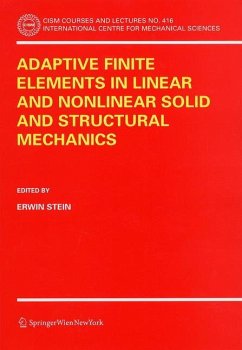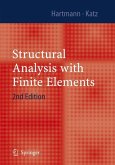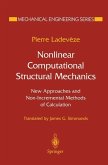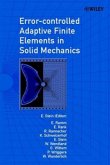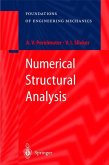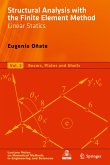The work deals with a systematic theoretical and problem-oriented treatment of fundamental topics in the wide area of error-controlled adaptive finite element methods for analyzing engineering structures with elastic and inelastic material behavior applied to engineering structures. Different types of error estimators are presented from both mathematical and engineering points of views: global estimators and goal-oriented estimators based on duality techniques, controlling h-, p-, and hp-adaptivity.
Special features are: combined model and discretization adaptivity for thin-walled structures, hierarchic modeling in elasticity and related hp-adaptivity, error estimators of constitutive equations, adequate mesh refinement techniques and error-controlled adaptive elastic-plastic analysis of contact problems.
The benefits are seen in new methods and results of leading researches in the field which provide deeper insight into recent developments of a posteriori error analysis and adaptivity.
This course with 6 lecturers intends to present a systematic survey of recent re search results of well-known scientists on error-controlled adaptive finite element methods in solid and structural mechanics with emphasis to problem-dependent concepts for adaptivity, error analysis as well as h- and p-adaptive refinement techniques including meshing and remeshing. Challenging applications are of equal importance, including elastic and elastoplastic deformations of solids, con tact problems and thin-walled structures. Some major topics should be pointed out, namely: (i) The growing importance of goal-oriented and local error estimates for quan tities of interest-in comparison with global error estimates-based on dual finite element solutions; (a) The importance of the p-version of the finite element method in conjunction with parameter-dependent hierarchical approximations of the mathematical model, for example in boundary layers of elastic plates; (Hi) The choice of problem-oriented error measures in suitable norms, consider ing residual, averaging and hierarchical error estimates in conjunction with the efficiency of the associated adaptive computations; (iv) The importance of implicit local postprocessing with enhanced test spaces in order to get constant-free, i. e. absolute-not only relative-discretizati- error estimates; (v) The coupling of error-controlled adaptive discretizations and the mathemat ical modeling in related subdomains, such as boundary layers. The main goals of adaptivity are reliability and efficiency, combined with in sight and access to controls which are independent of the applied discretization methods. By these efforts, new paradigms in Computational Mechanics should be realized, namely verifications and even validations ofengineering models.
Special features are: combined model and discretization adaptivity for thin-walled structures, hierarchic modeling in elasticity and related hp-adaptivity, error estimators of constitutive equations, adequate mesh refinement techniques and error-controlled adaptive elastic-plastic analysis of contact problems.
The benefits are seen in new methods and results of leading researches in the field which provide deeper insight into recent developments of a posteriori error analysis and adaptivity.
This course with 6 lecturers intends to present a systematic survey of recent re search results of well-known scientists on error-controlled adaptive finite element methods in solid and structural mechanics with emphasis to problem-dependent concepts for adaptivity, error analysis as well as h- and p-adaptive refinement techniques including meshing and remeshing. Challenging applications are of equal importance, including elastic and elastoplastic deformations of solids, con tact problems and thin-walled structures. Some major topics should be pointed out, namely: (i) The growing importance of goal-oriented and local error estimates for quan tities of interest-in comparison with global error estimates-based on dual finite element solutions; (a) The importance of the p-version of the finite element method in conjunction with parameter-dependent hierarchical approximations of the mathematical model, for example in boundary layers of elastic plates; (Hi) The choice of problem-oriented error measures in suitable norms, consider ing residual, averaging and hierarchical error estimates in conjunction with the efficiency of the associated adaptive computations; (iv) The importance of implicit local postprocessing with enhanced test spaces in order to get constant-free, i. e. absolute-not only relative-discretizati- error estimates; (v) The coupling of error-controlled adaptive discretizations and the mathemat ical modeling in related subdomains, such as boundary layers. The main goals of adaptivity are reliability and efficiency, combined with in sight and access to controls which are independent of the applied discretization methods. By these efforts, new paradigms in Computational Mechanics should be realized, namely verifications and even validations ofengineering models.

